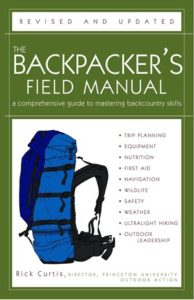 I want to let everyone know about the release of the 6th Edition of Wilderness Medicine, the premiere textbook on the subject, edited by our frequent contributor Dr. Paul Auerbach. There are not too many books out there that I personally consider as “classics” in our field (titles like Mountaineering: The Freedom of the Hills comes to mind), for wilderness medicine, this book is a classic. I’ve used previous editions of this book for teaching first aid and it was one of my core reference books when writing the first aid chapter in The Backpacker’s Field Manual. I’m really excited to see this new edition and that there will be an ebook version. At over 2,300 pages it’s no wonder that this textbook is widely referred to as “The Bible of Wilderness Medicine.”
I want to let everyone know about the release of the 6th Edition of Wilderness Medicine, the premiere textbook on the subject, edited by our frequent contributor Dr. Paul Auerbach. There are not too many books out there that I personally consider as “classics” in our field (titles like Mountaineering: The Freedom of the Hills comes to mind), for wilderness medicine, this book is a classic. I’ve used previous editions of this book for teaching first aid and it was one of my core reference books when writing the first aid chapter in The Backpacker’s Field Manual. I’m really excited to see this new edition and that there will be an ebook version. At over 2,300 pages it’s no wonder that this textbook is widely referred to as “The Bible of Wilderness Medicine.”
This is one book that I recommend that every serious outdoor program have on the shelf as the ultimate reference guide. It covers every conceivable aspect of wilderness medicine in articles written by experts from around the world. What makes this book stand out is the combination of the breadth of coverage and its great readability. I try and keep current on wilderness medicine issues, but as a non-physician, reading things like the New England Journal of Medicine often leaves me scratching my head at the super-technical things that I don’t have the background for. This textbook, written for both medical professionals and non-medical provides a great balance. Don’t let the price tag deter you, any textbook of this magnitude is worth every penny. The book is available from the publisher Elsevier.com as well as on Amazon.com in hardcover and Kindle format and at Barnes and Noble in hardcover and Nook format.
From the Publisher:
“Quickly and decisively manage any medical emergency you encounter in the great outdoors with Wilderness Medicine! World-renowned authority and author, Dr. Paul Auerbach, and a team of experts offer proven, practical, visual guidance for effectively diagnosing and treating the full range of emergencies and health problems encountered in situations where time and resources are scarce. Every day, more and more people are venturing into the wilderness and extreme environments, or are victims of horrific natural disasters…and many are unprepared for the dangers and aftermath that come with these episodes. Whether these victims are stranded on mountaintops, lost in the desert, injured on a remote bike path, or ill far out at sea, this indispensable resource–now with online access at www.expertconsult.com for greater accessibility and portability– equips rescuers and health care professionals to effectively address and prevent injury and illness in the wilderness!
From Paul Auerbach:
I’m thrilled to let you know that the 6th edition of the textbook Wilderness Medicine, for which I serve as Editor, is now available. The book is the culmination of more than three years’ work, and the publisher (Elsevier) has done a terrific job with the layout. The book contains 114 chapters, including a tremendous amount of information new to this edition.
This is the big reference book for medical and rescue professionals, educators, scientists, explorers, and others with wilderness medicine interests and activities. The depth of topic coverage underlies much of my other writing. The contributors have gone the extra mile to update their previous work, make new contributions, and do their best to create a comprehensive, encyclopedic work. I’m grateful to have had the opportunity to mold this edition, and am particularly pleased that the publisher allowed me to add chapters on matters related to wilderness preservation. I hope you find it an informative, useful, and fascinating book.
Here’s the Table of Contents:
PART 1 – Mountain Medicine
- High-Altitude Medicine and Physiology
- Avalanches
- Lightning Injuries
PART 2 – Cold and Heat
- Thermoregulation
- Accidental Hypothermia
- Immersion Into Cold Water
- Nonfreezing Cold-Induced Injuries
- Frostbite
- Polar Medicine
- Pathophysiology of Heat-Related Illnesses
- Clinical Management of Heat-Related Illnesses
PART 3 – Burns, Fire, and Radiation
- Wildland Fires: Dangers and Survival
- Emergency Care of the Burned Victim
- Exposure to Radiation From the Sun
- Volcanic Eruptions, Hazards, and Mitigation
PART 4 – Injuries and Medical Interventions
- Injury Prevention: Decision Making, Safety, and Accident Avoidance
- Principles of Pain Management
- Taping and Bandaging
- Splints and Slings
- Emergency Airway Management
- Wilderness Trauma and Surgical Emergencies
- Wound Management
- Improvised Medicine in the Wilderness
- Hunting and Fishing Injuries
- Tactical Medicine
- Combat and Casualty Care
- Wilderness Orthopedics
- The Eye in the Wilderness
- Foot Problems and Care
- Wilderness Dentistry
- Management of Facial Injuries
- Wilderness Cardiology
- Wilderness Neurology
- Chronic Diseases and Wilderness Activities
- Mental Health in the Wilderness
PART 5 – Rescue and Survival
- Wilderness Emergency Medical Services and Response Systems
- Search and Rescue
- Technical Rescue, Self-Rescue, and Evacuation
- Litters and Carries
- Helicopter Rescue and Aeromedical Transport
- Essentials of Wilderness Survival
- Principles of Meteorology and Weather Prediction
- Jungle Travel and Survival
- Desert Travel and Survival
- Whitewater Medicine and Rescue
- Caving and Cave Rescue
PART 6 – Animals, Insects, and Zoonoses
- Protection from Blood-Feeding Arthropods
- Mosquitoes and Mosquito-Borne Diseases
- Malaria
- Arthropod Envenomation and Parasitism
- Tick-Borne Diseases
- Spider Bites
- Scorpion Envenomation
- Bites by Venomous Reptiles in Canada, the United States, and Mexico
- Envenoming and Injuries by Venomous and Nonvenomous Reptiles Worldwide
- Bites and Injuries Inflicted by Wild and Domestic Animals
- Bear Behavior and Attacks
- Alligator and Crocodile Attacks
- Wilderness-Acquired Zoonoses
- Rabies
- Emergency Veterinary Medicine
PART 7 – Plants
- Seasonal and Acute Allergic Reactions
- Plant-Induced Dermatitis
- Toxic Plant Ingestions
- Toxic Mushroom Ingestions
- Ethnobotany: Plant-Derived Medical Therapy
PART 8 – Food and Water
- Field Water Disinfection
- Infectious Diarrhea From Wilderness and Foreign Travel
- Nutrition, Malnutrition, and Starvation
- Dehydration, Rehydration, and Hyperhydration
- Living Off the Land
- Seafood Toxidromes
- Seafood Allergies
PART 9 – Marine Medicine
- A Brief Introduction to Oceanography
- Submersion Injuries and Drowning
- Emergency Oxygen Administration
- Diving Medicine
- Hyperbaric Medicine
- Injuries From Nonvenomous Aquatic Animals
- Envenomation by Aquatic Invertebrates
- Envenomation by Aquatic Vertebrates
- Aquatic Skin Disorders
- Safety and Survival at Sea
PART 10 – Travel, Environmental Hazards, and Disasters
- Travel Medicine
- Non-North American Travel and Exotic Diseases
- Natural Disaster Management
- Expedition Medicine
- Global Humanitarian Medicine and Disaster Relief
- Natural and Human-Made Hazards: Disaster Risk Management Issues
PART 11 – Equipment and Special Knowledge
- Global Crimes, Incarceration, and Quarantine
- Wilderness Preparation, Equipment, and Medical Supplies
- Ultrasound and Telemedicine in the Wilderness
- Outdoor Clothing for the Wilderness Professional
- Nonmedical Backcountry Equipment for Wilderness Professionals
- Ropes and Knot Tying
- Wilderness Navigation Techniques and Communication Methods
PART 12 – Special Populations and Considerations
- Training for Wilderness Adventure
- Exercise, Conditioning, and Performance Training
- Children in the Wilderness
- Women in the Wilderness
- Elders in the Wilderness
- Persons With Special Needs and Disabilities
- Wilderness and Endurance Events
- Ranch and Rodeo Medicine
- Wilderness Medicine Education
- Medical Liability and Wilderness Emergencies
- The Ethics of Wilderness Medicine
- Native American Healing
PART 13 – The Wilderness
- The Changing Environment
- Biodiversity and Human Health
- Health Implications of Environmental Change
- Wilderness Management and Preservation
- Leave No Trace
- Space Medicine: The New Frontier
- Appendix – Drug Stability in the Wilderness
INDEX
The hard copy book and e-reader versions both come with access to Elsevier’s expertconsult.com


